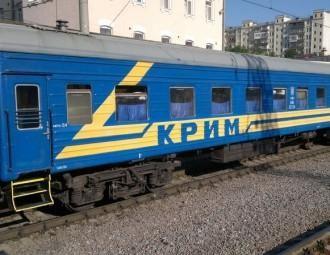Because of Ukraine’s crisis, this year Crimea is no longer on the list of holiday destinations

This summer the number of cars in a Minsk-Simferopol train is two-times lower than in 2013, writes Vital Ruhain.
It is early morning. People with huge bags begin to gather near the train. Many of them will head to Crimea. Some families have small kids.
"First of all, our relatives live there. Secondly, we are used to spend holidays there. We are told things are peace and quiet there. It is fearful to travel across Ukraine, but as they say: those who do not take risk, do not have a rest," says a girl who together with her mom is looking for her train car.
The train consists of only eight cars. One day before the departure, there were 32 3rd-class seats and 24 2nd-class seats. Only 2nd-class seats are available today. Since recently, the number of passengers has begun to grow, says the train master:
"Compared to the previous year, the number of car has dropped by seven. But we have spotted a trend that shows an increase in the flow of passengers. People who traveled there say the road on our way is quiet and there are problems in Simferopol. The trains proceeds via Sumy, Kharkiv, Zaporozhye, Melitopol. We do not see any troops or aggressive people."
At the border with Crimea, Belarusians go through passport controls - first Ukrainian, then Russian. Ukrainian border guards display no negative attitude towards Belarusian crossing into 'occupied Crimea'. Things are more complicated with the Russians.
"My wife is taking the train. I am following her in a bus, because I am the citizen of Russia. I fear they could take me off the train. We called the border guards and the customs agency and they said I should rather not take the risk. I am a Russian citizen and my age is not allowed. But we love Crimea very much and this love is stronger than fear," says the man who is seeing off his wife near the train.
There are 65 3rd-class tickets and 37 2nd-class tickets left for July 18. Tickets costs Br 807 000 and Br 1280 000 ($90 and $120), correspondingly. This is unbelievable. Previously, all Crimea-bound tickets would be sold out in the first days of sales. Travel agents currently do not deal much with Crimea. There are those willing to travel to Crimea but they are very few, Euroradio is told at GoldenTour.
"Perhaps, other companies work with Crimea, but we only sell accommodation there to people. We do not offer organized bus tours because we want to avoid problems. People buy their train tickets on their own. Getting there is their own responsibility and risk. We only sell accommodation."
CenterKurort continues to sell holiday packages to Belarus-owned resorts in Crimea. They have business as usual, yet demand is lower than last year.
"We sell only 15 percent against 100 percent last year. We work with various operators. We also offer tickets and transportation. Mainly, people are interested in resorts where they stayed for several years in a row. This summer, we reorient our clients for beaches, family holidays and trips for youngsters to the resorts in Russia's Krasnodar region or beaches in the far abroad."
The packages to other Belarusian resorts are sold out till mid-September.
Official statistics suggest that Ukraine accounted for almost 25 percent of all destinations favored by Belarusians. Almost 176 000 Belarusian traveled to the resorts in Ukraine last year via travel agents alone. It is a totally different story this year. So, where are Belarusians traveling to spend their summer break?
"Several hundreds thousand people went to other destinations. But it seems that the majority has not traveled there. They prefer to go where everything is clear and quiet, where the image is good. At this point, it is difficult to say who is experiencing more problems: travel agents or tourists, because companies have changed their orientations," saysLilia Kobzik, Tourism and Leisure newspaper editor-in-chief.
Because of the crisis in Ukraine, this year our southern neighbor is no longer on the list of holiday destinations. Bulgaria and Turkey now top the list followed by Greece and Spain.
-
03.01
-
07.10
-
22.09
-
17.08
-
12.08
-
30.09



























